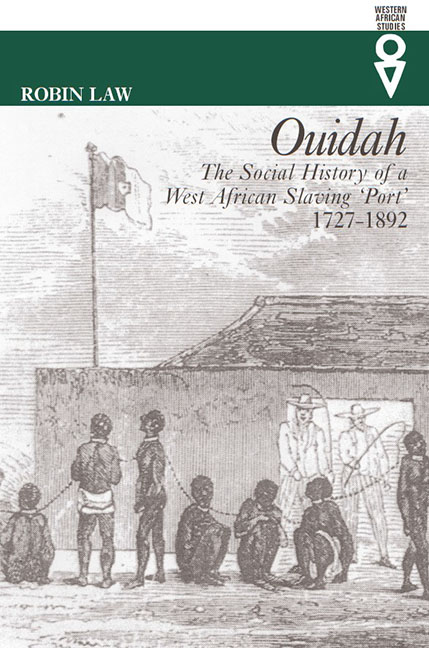Book contents
- Frontmatter
- Dedication
- Contents
- List of Maps & Tables
- Acknowledgements
- Abbreviations
- Map
- Introduction
- 1 Origins: Ouidah before the Dahomian conquest
- 2 The Dahomian Conquest of Ouidah
- 3 Dahomian Ouidah
- 4 The Operation of the Atlantic Slave Trade
- 5 De Souza's Ouidah The era of the illegal slave trade 1815 –39
- 6 The Era of Transition From slaves to palm oil 1840–57
- 7 Dissension & Decline Ouidah under King Glele 1858–77
- 8 From Dahomian to French Rule 1878-92
- Sources & Bibliography
- Index
4 - The Operation of the Atlantic Slave Trade
Published online by Cambridge University Press: 25 October 2017
- Frontmatter
- Dedication
- Contents
- List of Maps & Tables
- Acknowledgements
- Abbreviations
- Map
- Introduction
- 1 Origins: Ouidah before the Dahomian conquest
- 2 The Dahomian Conquest of Ouidah
- 3 Dahomian Ouidah
- 4 The Operation of the Atlantic Slave Trade
- 5 De Souza's Ouidah The era of the illegal slave trade 1815 –39
- 6 The Era of Transition From slaves to palm oil 1840–57
- 7 Dissension & Decline Ouidah under King Glele 1858–77
- 8 From Dahomian to French Rule 1878-92
- Sources & Bibliography
- Index
Summary
Ouidah under Dahomian rule was more than simply a site of European trade. Even in narrowly economic terms, it was also a centre for fishing and salt production, as well as for local trade, especially along the coastal lagoon. It also served, as has been seen, as a seat of Dahomian provincial administration and as a military garrison town. Nevertheless, its central function was in trade with Europeans; this is not just a Eurocentric perception, it was shared by the Dahomians themselves, as reflected in the title of the administrator of the town, Yovogan, ‘Chief of the white men’. Ouidah was a ‘white man's town’, not in the sense of being under European control but in that its principal function was as the site of trade with Europeans.
The Dahomian kings continued the policy of the earlier Hueda kings, of maintaining Ouidah as a neutral port where hostilities among Europeans were prohibited. In 1755, for example, Tegbesu sent to Ouidah to remind the directors of the European forts that ‘the road should be free and nobody should be molested while at anchor there’; in 1762, when British ships fired on a canoe delivering supplies to the French fort, he again sent to protest and to ‘desire all white men to live in friendship and let all palavers drop’. In 1791, when war with France was again threatening, the British were still confident that Ouidah would remain a safe haven, since ‘the king of Dahomey is so absolute a monarch there as never to suffer any Europeans settled in his dominions to have any controversies of any hostile nature whatever’. The policy began to break down only after 1794, when the French revolutionary government, having ended its own slave trade and thus no longer having any interest in the security of the Ouidah ‘port’, began a systematic campaign of piracy against British and Portuguese shipping at Ouidah and elsewhere on the Bight of Benin.
- Type
- Chapter
- Information
- OuidahThe Social History of a West African Slaving Port 1727-1892, pp. 123 - 154Publisher: Boydell & BrewerPrint publication year: 2017

